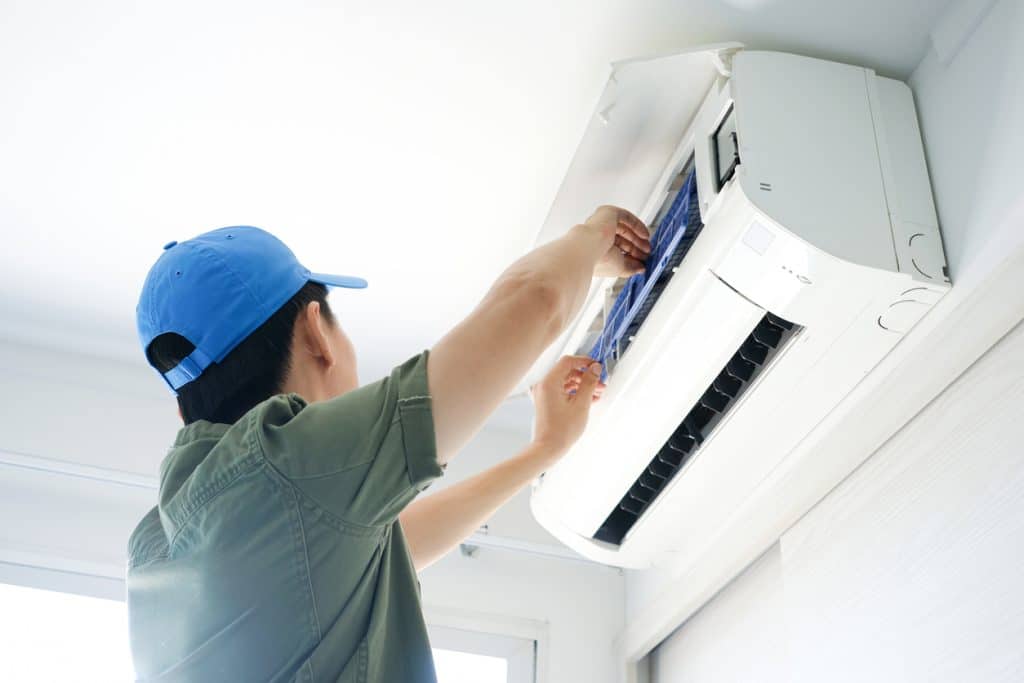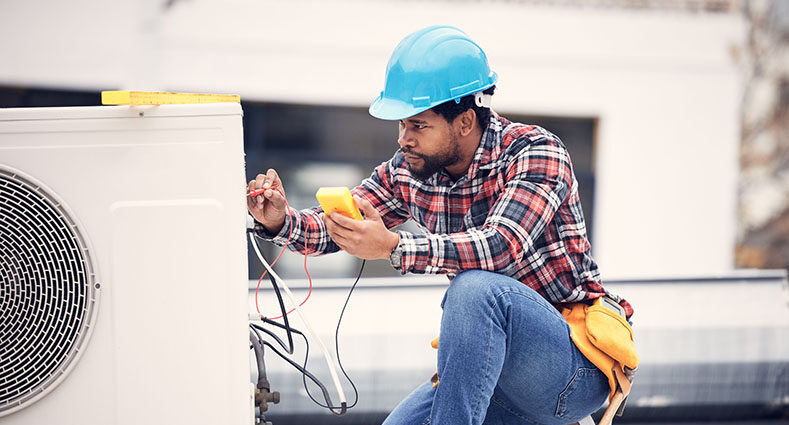DIY vs professional for a quick ac fix
The Significance of Heating And Cooling Understanding: Discovering Sources Of AC Issues for Homeowners
Property owners often neglect the value of recognizing their HVAC systems. Recognizing common signs of a/c issues can cause prompt interventions. Issues like not enough air conditioning or uncommon sounds are not just annoyances; they can suggest much deeper issues. By exploring the origin of these troubles, homeowners can enhance system efficiency and expand its life-span. What are the most common issues that can occur, and exactly how can they be properly resolved?
Usual Signs of A/c Troubles
Just how can home owners determine issues with their cooling systems prior to they rise? Identifying usual signs of air conditioning troubles is essential for prompt upkeep. One prevalent indication wants cooling; if the a/c device falls short to lower the interior temperature level, it might signal underlying concerns. Uncommon sounds, such as grinding or hissing, can likewise show mechanical failures or loose elements - air conditioner repair. Additionally, home owners need to watch out for unusual smells originating from the system, which might recommend mold growth or electric troubles. Constant cycling on and off, referred to as short cycling, can suggest thermostat concerns or refrigerant leaks. In addition, a rise in power costs without a corresponding increase in usage might indicate ineffectiveness. By remaining alert to these caution indications, house owners can stop much more considerable concerns and costly repair work, guaranteeing their cooling systems run effectively throughout the warmer months

Comprehending Refrigerant Issues
Refrigerant problems can substantially affect the efficiency of an a/c system. House owners should know the indicators of reduced cooling agent levels and the significance of detecting refrigerant leakages. Dealing with these problems quickly can avoid further damages to the system and guarantee optimal cooling down performance.
Reduced Refrigerant Levels
A typical issue that property owners might come across with their a/c systems is reduced cooling agent degrees, which can significantly impact the system's efficiency and performance. Cooling agent is essential for the cooling procedure, taking in warm from indoor air and launching it outside. When degrees drop, the cooling system struggles to cool the room successfully, bring about increased energy usage and prospective system stress. Signs and symptoms of reduced cooling agent consist of insufficient air conditioning, longer run times, and ice formation on the evaporator coils. Property owners may likewise see uncommon sounds as the compressor functions harder to make up for the shortage. It is necessary for property owners to recognize the significance of preserving correct cooling agent degrees to assure peak heating and cooling performance and longevity.
Refrigerant Leaks Detection
Where might a house owner start when encountered with the possibility of refrigerant leaks in their cooling and heating system? The initial action involves monitoring the system's performance. Signs such as decreased cooling down performance, ice development on coils, or hissing sounds may suggest a cooling agent leakage. Home owners need to also look for noticeable indicators of oil deposit, commonly an indication of a leak. Utilizing a refrigerant leakage detector can offer even more accurate recognition. If suspicions persist, consulting a licensed heating and cooling professional is important, as they possess the proficiency and equipment to situate leaks effectively. Trigger discovery and repair of cooling agent leaks not just boost system efficiency yet also prevent prospective ecological damage, making it an essential facet of cooling and heating upkeep.
Electric Failures and Their Effect
Electric failures can substantially influence a/c systems, specifically via problems like circuit breaker malfunctions and defective circuitry. These issues not only interfere with the system's efficiency but can additionally cause expensive repair services and safety dangers. Understanding the ramifications of such failures is crucial for house owners to maintain an effective and safe heating and cooling environment.
Breaker Issues
How can circuit breaker problems impact the effectiveness of an a/c system? Circuit breakers offer as vital safety gadgets that take care of electrical circulation to a/c units. If a breaker journeys frequently, it interrupts power supply, leading to irregular home heating or air conditioning. This can create significant pressure on the system, causing ineffective operation and possible damages to parts. Home owners might observe increased power costs due to the cooling and heating system's struggle to preserve wanted temperature levels. Furthermore, duplicated interruptions from tripped breakers can shorten the lifespan of the a/c unit, requiring expensive fixings or replacements. Regular maintenance of breaker is important, as it assures a stable power supply, ultimately enhancing the general effectiveness of the a/c system.
Faulty Circuitry Impact
Frequently forgotten, damaged circuitry can have alarming effects for a/c systems. Wiring concerns may bring about short circuits, causing regular failures and boosted repair service costs. Furthermore, inappropriate electrical wiring can trigger inefficient power use, bring about higher utility costs and stress on the system. In extreme instances, faulty circuitry can set off electrical fires, posing a significant safety and security danger to house owners. These electrical failures can harm Heating and cooling components, resulting in expensive substitutes or considerable repairs. Homeowners need to focus on regular evaluations by qualified professionals to identify and correct electrical wiring troubles before they intensify. Understanding the implications of malfunctioning electrical wiring can assist assure the longevity and security of heating and cooling systems, eventually safeguarding find more both the home and its passengers.
Clogged Filters and Their Effects
While lots of homeowners might overlook the significance of normal filter upkeep, stopped up filters can lead to substantial effects for heating and cooling systems. When filters become obstructed with dirt, dirt, and particles, air movement is limited. This decrease in airflow compels the system to function harder, leading to enhanced energy consumption and potentially higher utility expenses. Gradually, this pressure can trigger wear and tear on parts, leading to premature system failing.
Additionally, stopped up filters can jeopardize indoor air top quality. Contaminants and irritants may circulate throughout the home, exacerbating respiratory issues and allergies for occupants. Inadequate air flow can trigger the evaporator coil to ice up, leading to costly repair services and ineffective air conditioning efficiency. Frequently changing or cleaning filters is a basic yet crucial maintenance task that can assist ensure the durability and efficiency of HVAC systems, eventually profiting both the homeowner's convenience and their financial resources.

Thermostat Malfunctions Clarified
What occurs when a thermostat breakdowns can considerably influence both convenience and power performance in a home (Fix broken Air conditioner). A faulty thermostat may fail to precisely check out the temperature, resulting in overcooling or insufficient cooling. This inconsistency can cause pain for passengers and lead to greater power costs, as the cooling and heating system works harder than needed
Typical issues consist of dead batteries, which can make electronic thermostats faulty, and loosened circuitry that interferes with communication in between the thermostat and the HVAC system. Furthermore, obsolete or badly calibrated thermostats may not respond appropriately to temperature modifications, further exacerbating energy ineffectiveness.
House owners should be cautious for indications of malfunction, such as irregular temperature levels or unanticipated energy prices. Normal checks and understanding of the thermostat's performance can assist recognize troubles early, ensuring peak performance of the cooling and heating system. Dealing with thermostat problems without delay is necessary for preserving a comfy living environment and managing power intake properly.
The Function of Regular Upkeep
Regular maintenance plays an essential role in making certain the durability and performance of heating and cooling systems. Home owners who focus on routine checks can prevent minor issues from rising right into pricey fixings. Normal upkeep typically consists of jobs such as cleaning up filters, inspecting ductwork, and checking refrigerant levels. These activities assist maintain optimal air Read More Here movement and system performance, decreasing power intake.
A well-maintained HVAC system operates a lot more efficiently, offering constant comfort throughout the home. Regular tune-ups can likewise prolong the life-span of the system, bring about significant savings with time. House owners are encouraged to schedule professional assessments at the very least as Bonuses soon as a year to identify possible problems early.
In enhancement, numerous suppliers require routine upkeep to promote warranties, making this practice not only useful yet typically needed. On the whole, recognizing the importance of regular maintenance empowers home owners to secure their cooling and heating systems against unexpected failings and improve their investment in home comfort.
Often Asked Questions
How Can I Improve My Air conditioner's Energy Performance?
Improving an a/c's power effectiveness includes normal maintenance, cleansing or replacing filters, securing ductwork, making certain correct insulation, using programmable thermostats, and organizing specialist assessments to identify and correct prospective concerns affecting performance.
What Is the Lifespan of a Normal Air Conditioning Device?
A typical a/c device has a life expectancy of 15 to two decades, relying on upkeep, usage, and environmental aspects. Regular upkeep can considerably prolong its functional life and improve overall performance.
When Should I Change My Air Conditioning System?
A cooling system need to usually be changed every 10 to 15 years. Indications for substitute consist of constant fixings, rising energy bills, and inadequate air conditioning, showing that an upgrade might be more economical and efficient.
Can I Fix Air Conditioner Problems Myself?
Yes, people can troubleshoot air conditioning troubles themselves by examining filters, guaranteeing power supply, and evaluating for noticeable issues (AC repairman). Complex problems often call for professional assistance for exact medical diagnosis and secure repair work, ensuring excellent system performance.
How Do I Select a Trustworthy A/c Technician?

To choose a reliable cooling and heating specialist, one should look for referrals, inspect on-line reviews, validate licenses and insurance, analyze experience, and request comprehensive price quotes to assure top quality solution and fair rates prior to making a choice.
Final thought
To summarize, a solid understanding of HVAC systems makes it possible for house owners to effectively detect and attend to typical a/c issues. Recognizing signs such as insufficient air conditioning or climbing energy prices permits prompt treatments, which can considerably improve system performance and durability. By staying informed about possible issues like cooling agent leaks, electrical failures, and blocked filters, homeowners can take aggressive steps to maintain their systems, ultimately guaranteeing convenience and advertising a much healthier living atmosphere. Routine maintenance remains essential to this undertaking.